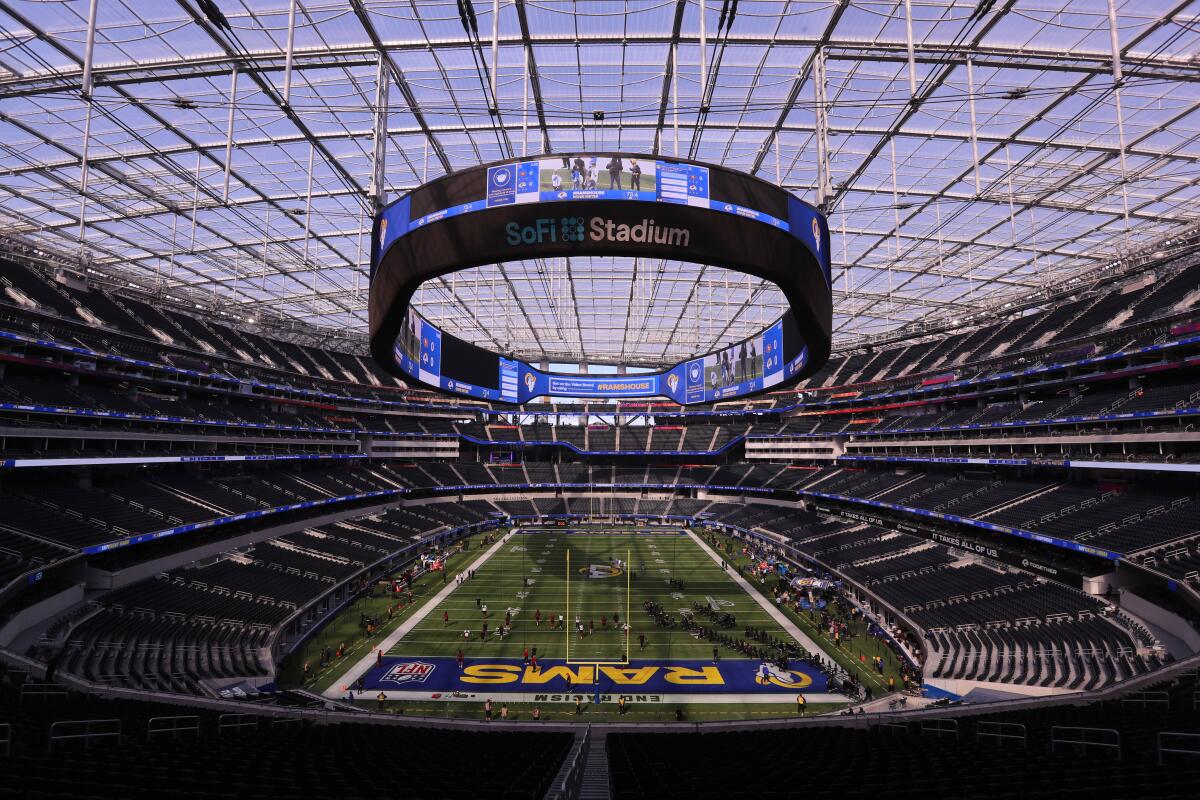Rep. Maxine Waters seeks to stop ‘ridiculous’ $2-billion SoFi transit project ahead of Olympics

- Share via
Blasting a $2-billion people mover that would link SoFi Stadium to one of Los Angeles’ newest rail lines, Rep. Maxine Waters is on a mission to halt a project she called “ridiculous.”
“To the degree that I can do anything to stop it, I will do it,” she said Wednesday. “It’s a project that has turned out to be totally unnecessary and totally much too costly.”
The veteran lawmaker argues the elevated people mover — once touted as a marquee piece for the 2028 Olympic Games — won’t help those living in the working-class but gentrifying community. She suggested the Inglewood Transit Connector, or ITC, will be more useful to ferry fans flocking to the cluster of multibillion-dollar stadiums that have come to dominate the city of 107,000.
In a letter to U.S. Transportation Secretary Pete Buttigieg sent last week, Waters (D-Los Angeles) argued the money would be “better spent on programs that improve access to affordable housing.”
“It will not provide convenient connectivity to employment or public services for local residents,” she said. “The ITC is designed primarily to allow public transit users to connect the extra 1.6 miles from Metro’s K Line to sports and entertainment venues. Shuttle buses could most likely accomplish the same goal at a fraction of the cost, but have not been seriously considered as an alternative.”
Buttigieg’s federal agency has committed $1 billion to the project, about half its expected cost. But after the letter went out to members of the House appropriations subcommittee, its chair, Rep. Steve Womack (R-Ark.), stripped $200 million — an installment of the full funding amount — in a draft budget bill.
The final bill still must be reconciled with the Senate and could change. Sen. Alex Padilla (D-Calif.) has supported the project in the past, but was unavailable to comment Wednesday.
Cost projections for the project have doubled and delays have made it unclear whether it can actually be delivered ahead of the Olympic Games in 2028.

Waters noted that housing prices have jumped 37% in four years in the Los Angeles metro region, and rents have shot up too, causing more evictions, rising debt and homelessness.
“The ITC threatens to exacerbate this crisis by displacing long-time Inglewood residents and small and minority-owned businesses and diverting resources away from some of the most urgent needs of the local communities in my district,” she wrote.
Waters’ objections put her at odds with another longtime Black political figure in the region, Inglewood Mayor James Butts, who conceived the project and has been its biggest champion. The four-term mayor has courted billionaires and inked deals to build SoFi Stadium and Intuit Dome that have transformed his community.
“You can’t come in at the 11th hour with a little fairy tale story about how something is so terrible,” he said. The letter was “ill-conceived” and many of the points “fully invalid.”
Butts told The Times that Waters did not reach out to him to discuss the matter.
He asked: “Who would lobby against a project that will go on for five to six years and provide prevailing wage jobs for 17,000 people?”
The project, he points out, is estimated to add 2,400 to 3,300 daily riders to the Metro K Line on event days and bring in 25,000 riders to Metro’s system. And it has wide support and has been vetted by federal officials.
“It’s a catalyst for Metro,” Butts said. “It’s going to reduce greenhouse gases. It’s going to remove cars from the roadway. It’s going to remove the impact on the residents of Inglewood on game days and concert days.”
The fight over the project comes a little over a week before the Olympic Games in Paris begin. L.A. Mayor Karen Bass and other officials are watching closely as pressure builds on them to prepare for Games that have drained other host city coffers. City leaders have vowed not to spend money on erecting Olympic venues, but expanding bus service for events is estimated to cost up to $1 billion.
Some opponents have called the new line an expensive perk that was pushed for because of the Games. Federal documents show it won’t be operational until 2030.
The fully automated, three-stop people mover is designed to roll through Inglewood’s downtown and ferry fans to SoFi, the Kia Forum and the soon-to-be opened Intuit Dome.
Jeff Davis, a senior fellow at the Eno Center for Transportation, a think tank, said the project was fast-tracked for the Olympics and said stadium owners could bear more of the financial responsibility. The Eno Center estimated that the project would cost $470,000 per estimated daily rider, far more than other federally funded transit projects.
“The project is less about connecting underserved neighborhoods than it is about connecting the new Rams stadium and the adjacent office and entertainment complex,” he wrote in March.
Davis said Rams owner Stan Kroenke, who also developed Sofi Stadium and the surrounding entertainment complex, will reap the benefits of the train when built, raising questions of how much real estate interests should contribute for the increased value the rail will bring.
The opposition is a major break for Waters, who three years ago wrote in support of a $20-million grant for the line. Waters said she changed her mind as she learned that dozens of businesses would be forced to move, and that the cost per station was more than double that of the nearby K Line.
“I should have paid more attention early on, so that I wouldn’t have discovered so much about it late,” she said.
“I just think that when our constituents look at how we make decisions and what our priorities are. This is the worst example.”
Times staff writer Liam Dillon contributed to this report.
More to Read
Sign up for Essential California
The most important California stories and recommendations in your inbox every morning.
You may occasionally receive promotional content from the Los Angeles Times.











